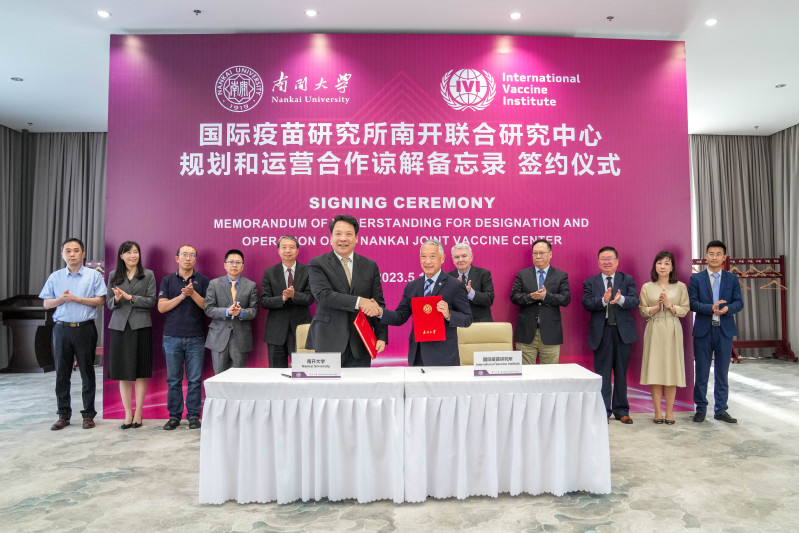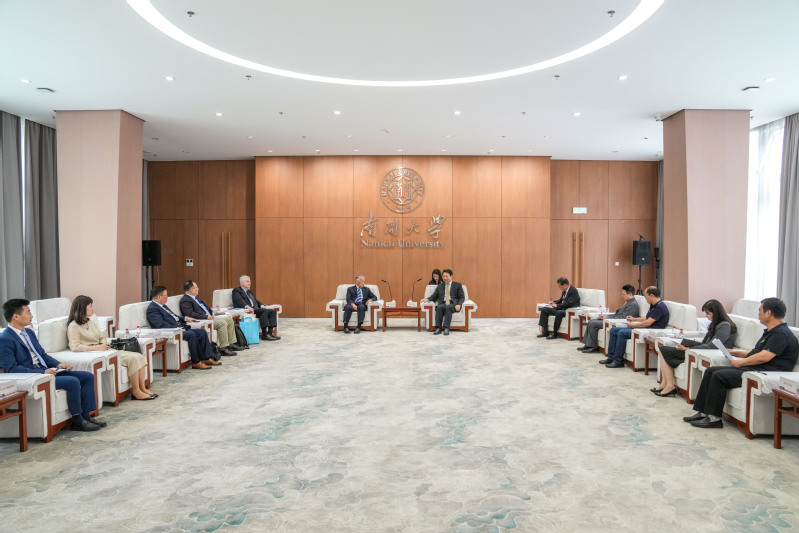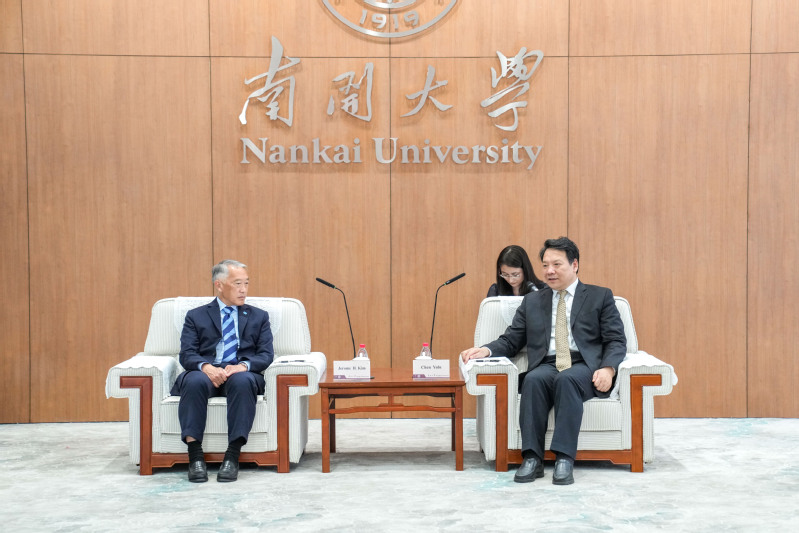Nankai University and the International Vaccine Institute Signed the MOU to Build the IVI Nankai Joint Vaccine Center

May 16, 2023, Tianjin China--On May 16, the signing ceremony for the “Memorandum of Understanding (MOU) for Designation and Operation of IVI Nankai Joint Vaccine Center” was held at Nankai University, Tianjin, China. This is the first Joint Research Institution that the International Vaccine Institute (IVI), which was initiated by the United Nations Development Programme (UNDP), establishes in China.
Chen Yulu, President of Nankai University, and Jerome H. Kim, Director General of IVI signed the MOU on behalf of both sides. Wang Lei, Vice President of Nankai University, and Jean-Louis Excler, Programme Director of New Initiatives, IVI, attended the signing ceremony.
According to the MOU, Nankai University and IVI will establish the “IVI Nankai Joint Vaccine Center,” engage in in-depth cooperation in fields of vaccine research and development, global public health, international security, exchanges of researchers, and joint talent cultivation, etc., and launch leading and forward-looking world-class research projects. Moreover, the two parties will proactively connect with “Belt and Road” countries and low- and middle-income countries in terms of scientific research achievement transformation, technology transfer, and training of professionals. The two parties wish to jointly establish a leading, exemplary, and innovative cooperation model, and contribute to strengthening the global public health security agenda and building “a community of common health for humankind.”


Chen Yulu stated that in recent years, the value of vaccine innovation has become more and more prominent in responding to public health emergencies and promoting high-quality development of public health, especially in the process of the global fight against COVID-19. IVI, as a non-profit international organization, plays an important role in this process. Nankai University has strong research strength and advantages in the field of public health and biomedicine and hopes to actively promote bilateral cooperation with IVI to carry out innovative vaccine research and development and provide international public goods. Nankai University believes that the joint efforts, in serving the “Belt and Road Initiative” and other practices, can help improve the accessibility of vaccines in developing countries, improve global public health governance, and make more contributions to the building of “a community with a shared future for mankind” and “a community of common health for mankind”.
Jerome H. Kim said that IVI is committed to discovering, developing, and delivering safe, effective, and affordable vaccines for global public health. The innovation of vaccine technology and research capacity concerns human life and health. IVI hopes to carry out in-depth cooperation with Nankai University to promote vaccine research and development through science and technology, provide high-quality international public goods to the world, actively promote the development of global public health, and make contributions to human life, health, and well-being.
Heads of Nankai University’s offices and institutes, including Office of International Affairs, Office for Science and Technology Research, Office for Humanities & Social Sciences Research, State Key Laboratory of Medicinal Chemical Biology, and TEDA Institute of Biology Sciences and Biotechnology, attended the signing ceremony and the working meeting.
IVI, founded in 1997, is a non-profit international organization initiated by the United Nations Development Programme (UNDP). Its mission is to discover, develop, and deliver safe, effective, and affordable vaccines for global public health. China became a member of the IVI after signing the IVI Establishment Agreement and Constitution in 1997.
IVI has strong scientific research capabilities in vaccine research and development and possesses knowledge, know-how, and skills along the complete vaccine value chain including, but not limited to, epidemiological research on infectious diseases, laboratory vaccine design and process development, clinical development, regulatory affairs, immunological assessments, vaccine delivery, training programs, quality systems, and managerial capacity. At the same time, IVI has rich experience in transformation of scientific and technological achievements and technology transfer and has established partnership with multiple qualified international vaccine industries to jointly provide vaccines to low- and middle-income countries and conduct technology transfer and professional training.
It is learnt that the cooperation between Nankai University and IVI has a good prospect and is of great practical significance. On one hand, it will be beneficial to the development of China's vaccine industry and have a positive impact on relevant industries and economic development in Tianjin and even the whole country. On the other hand, combined with China's actual production capacity, it will help alleviate the shortage of medical products in developing countries and promote the development of global public health.









